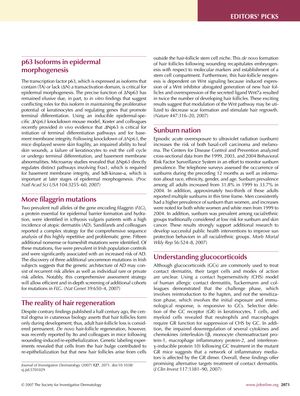Editors' Picks
September 2007
in “
Journal of Investigative Dermatology
”

TLDR ANp63 is crucial for skin integrity, new filaggrin gene mutations link to eczema, hair can regrow from non-stem cells, sunburns are increasing, and glucocorticoids help treat skin allergies by affecting immune cells.
The document summarizes several studies on skin biology and dermatology. Koster and colleagues used an inducible epidermal-specific ANp63 knockdown mouse model to show that ANp63 is essential for initiating terminal differentiation pathways and maintaining basement membrane integrity, with knockdown resulting in skin fragility and impaired wound healing. Sandilands and colleagues identified 15 additional mutations in the filaggrin gene (FLG), which is crucial for epidermal barrier function, and found these mutations to be associated with an increased risk of atopic dermatitis (AD), particularly in the Irish population. Ito and colleagues demonstrated that de novo hair follicle regeneration is possible in mice following wounding, with new follicles arising from non-stem cell sources and dependent on Wnt signaling, suggesting potential for hair regrowth therapies. The Centers for Disease Control and Prevention reported an increase in sunburn prevalence from 31.8% in 1999 to 33.7% in 2004, with men and white individuals experiencing higher rates, indicating a need for improved sun protection interventions. Lastly, Tuckermann and colleagues found that glucocorticoids (GCs) suppress contact hypersensitivity by acting on neutrophils and macrophages through the glucocorticoid receptor (GR), providing insight into the treatment of contact dermatitis.




